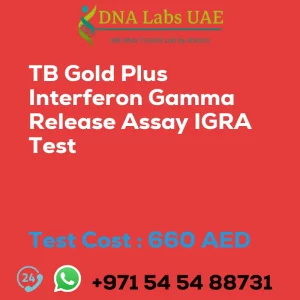CULTURED AFB ANTITUBERCULAR DST LEVOFLOXACIN Test
Test Cost: AED 660.0
Symptoms, Diagnosis, and Test Details
The Cultured AFB Antitubercular DST Levofloxacin test is a laboratory test used to determine the susceptibility of Mycobacterium tuberculosis to the antibiotic levofloxacin. Levofloxacin is commonly used in the treatment of tuberculosis. During the test, a sample of the bacteria is taken from the patient and cultured in the laboratory. The bacteria are then exposed to different concentrations of levofloxacin to determine the minimum inhibitory concentration (MIC) that effectively inhibits the growth of the bacteria. The MIC is the lowest concentration of the antibiotic that prevents visible growth of the bacteria.
The test helps in determining the effectiveness of levofloxacin in treating tuberculosis and guides the choice of appropriate antibiotics for the patient. It is particularly important in cases where drug-resistant strains of Mycobacterium tuberculosis are suspected.
Test Components and Price
Test Name: CULTURED AFB ANTITUBERCULAR DST LEVOFLOXACIN Test
Components: Levofloxacin
Price: AED 660.0
Sample Condition and Report Delivery
Sample Condition: Submit pure growth of Mycobacterium tuberculosis complex on appropriate media in sterile screw capped container in a sealed plastic bag. Ship refrigerated OR when used with other AFB culture or Mycobacteria identification tests, the pure growth obtained in the Laboratory from specimens already submitted will be processed for Antitubercular Sensitivity.
Report Delivery: Sample Daily by 3.30 pm; Report 21 days
Method and Test Type
Method: Automated Fluorescent
Test Type: Tuberculosis
Doctor and Test Department
Doctor: Physician
Test Department: DNA Labs UAE
Pre Test Information
No special preparation required
Conclusion
The results of the Cultured AFB Antitubercular DST Levofloxacin test can help healthcare providers in determining the most appropriate treatment regimen for patients with tuberculosis, ensuring that the antibiotics used are effective against the specific strain of bacteria present in the patient.
| Test Name | CULTURED AFB ANTITUBERCULAR DST LEVOFLOXACIN Test |
|---|---|
| Components | |
| Price | 660.0 AED |
| Sample Condition | Submit pure growth of Mycobacterium tuberculosis complexon appropriate media in sterile screw capped container in a sealed plastic bag. Ship refrigerated ORwhen used with other AFB culture or Mycobacteria identification tests, the pure growth obtained in the Laboratory from specimens already submittedwill be processed for Antitubercular Sensitivity. |
| Report Delivery | Sample Daily by 3.30 pm; Report 21 days |
| Method | Automated Fluorescent |
| Test type | Tuberculosis |
| Doctor | Physician |
| Test Department: | |
| Pre Test Information | No special preparation required |
| Test Details |
The Cultured AFB Antitubercular DST (Drug Susceptibility Testing) Levofloxacin test is a laboratory test used to determine the susceptibility of Mycobacterium tuberculosis (the bacterium that causes tuberculosis) to the antibiotic levofloxacin. Levofloxacin is a fluoroquinolone antibiotic commonly used in the treatment of tuberculosis. During the test, a sample of the bacteria is taken from the patient and cultured in the laboratory. The bacteria are then exposed to different concentrations of levofloxacin to determine the minimum inhibitory concentration (MIC) that effectively inhibits the growth of the bacteria. The MIC is the lowest concentration of the antibiotic that prevents visible growth of the bacteria. The test helps in determining the effectiveness of levofloxacin in treating tuberculosis and guides the choice of appropriate antibiotics for the patient. It is particularly important in cases where drug-resistant strains of Mycobacterium tuberculosis are suspected. The results of the Cultured AFB Antitubercular DST Levofloxacin test can help healthcare providers in determining the most appropriate treatment regimen for patients with tuberculosis, ensuring that the antibiotics used are effective against the specific strain of bacteria present in the patient. |








